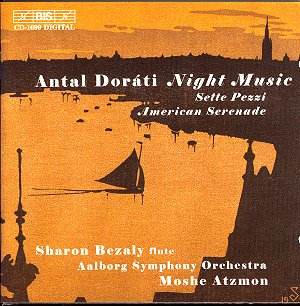Doráti is best known as a conductor. His complete
Haydn symphonies box reigned supreme until the appearance of Adam Fischer's
set on Brilliant Classics. Further back in time I recall his Sibelius
tone poems collections on EMI (Luonnotar, Oceanides and
Nightride and Sunrise).
Like Goossens, Markevitch and Furtwängler, Doráti
was also a composer. He studied with Wiener and Kodaly in his twenties
but his conducting activities suppressed the creative side until a full
re-blooming of that side of his life in his fifties.
The Sette Pezzi is drawn from his ballet Magdalena.
The string writing has the web-skein delicacy of Ravel and of early
Schoenberg. The music is ever so subtly dissonant standing between say
the harmonic pepper of Vaughan Williams' Sinfonia Antartica and
Job and the scorch and sear of William Schuman's writing for
massed strings. Passione is a good movement to sample. This music
has unruly Stravinskian manners - Petrushka and The Rite rubbed
down with astringent. The pieces have a symphonic manner and could easily
be thought of as a rather eccentric symphony such is the visionary power
by which they are galvanised.
Any thoughts that the flute/orchestra format might
dictate that Night Music would be trivial or light are soon confounded.
This is a work within the earnest nocturnal manner. Sharon Bezaly (whose
BIS flute and piano recital
I reviewed some three years ago) shows herself well matched to something
outside the fluff and glitter world. This is psychologically subtle,
melting between serenade, expressionistic dream, nightmare suggestion,
regret and the losing of the self in the world of sleep. There are five
movements. This would also work well with solo viola. If you have taken
well to William Alwyn's works for chamber ensemble with flute then you
will find this work well worth having.
Doráti fled Europe for
the USA in front of the murderous bow-wave of Nazi invasions. Like Martinů
and Karl Weigl he felt thankful to his saviour-nation. His American
Serenade is an early tribute in two movements: Spiritual
in which Hungarian folk music is blended with the Deep South and Dance
- a Britten-like rondo. With those movement titles this might easily
have been a work by Paul Creston. This is a much more straightforwardly
expressed work than the other two works of twenty or so years later.
This disc augurs well for other Doráti CDs:
BIS-CD-408 (Doráti Symphonies 1, 1956-57 and 2, 1985 - composer
conducts Stockholm PO) and BIS-CD-578 (including Doráti Pater
Noster).
The disc is well written up by Horst A Scholz.
Scholz.
For those who are interested I noticed a some months
back that there was a copy of Dorati's autobiography 'Notes of Seven
Decades' in the secondhand bookshop close to the library in Colchester,
Essex. It has been there for years.
Two harmonically astringent potently imaginative works
coupled with a bright and light-on-the-toes serenade.
Rob Barnett


